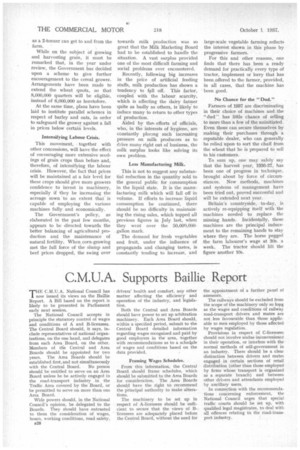C.M.U.A, Supports Baillie Report
Page 38

If you've noticed an error in this article please click here to report it so we can fix it.
THE C.M.U.A. National Council has now issued its views on the Baillie Report. A Bill based on the report is likely to be presented in Parliament early next session.
The National Council accepts in principle the statutory control of wages and conditions of A and B-licensees. The Central Board should, it says, include representatives of national organizations, on the one hand, and delegates from each Area Board, on the other. Members of the Central and Area Boards should be appointed for two years. The Area Boards should be established first, and not simultaneously
with the Central Board. No person should be entitled to serve on an Area Board unless he he actively engaged in the road-transport industry in the Traffic Area covered by the Board, or be permitted to serve on more than one Area Board.
Wide powers should, in the National Council's opinion, be delegated to the Boards. They should have entrusted to them the consideration of wages, hours, working conditions, road safety.
e28
drivers' health and comfort, any other matter affecting the efficiency and operation of the industry, and legislation.
Both the Central and Area Boards should have power to set up arbitration machinery. Each Area Board should, within a specified period, submit to the Central Board detailed information regarding wages recognized and paid by good employers in the area, together with recommendations as to a schedole of wages and conditions based on the data provided.
Framing Wages Schedules.
From this information, the Central Board should frame schedules, which should be submitted to the Area Boards for consideration. The Area Boards should have the right to recommend the principal authority to make alterations.
The machinery to be set up in respect of A-licensees should be sufficient to secure that the views of Blicensees are adequately placed before the Central Board, without the need for the appointment of a further panel of assessors.
The railways should be excluded from the scope of the machinery only so loug as the wages and conditions of railway road-transport drivers and mates are not less favourable than those applicable to men employed by those affected by wages regulation.
Provisions in respect of C-licensees should not involve undue inconvenience in their operation, or interfere with the normal methods of self-government in an industry. There should be a clear distinction between drivers and mates engaged in certain sections of retail distribution (other than those employed by firms whose transport is organized as a separate branch) and between other drivers and attendants employed by ancillary users.
In connection with the recommendations concerning enforcement, the National• Council urges that special traffic courts should be set up, with qualified legal magistrates, to deal with all offences relating to the road-transport industry.




















































































